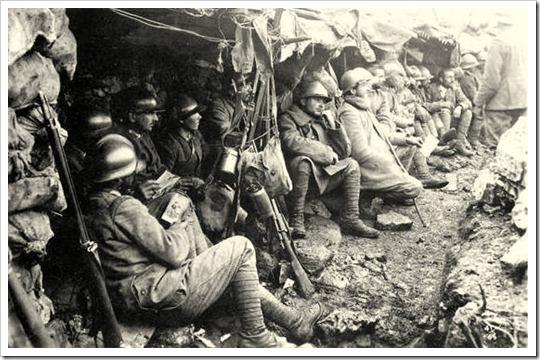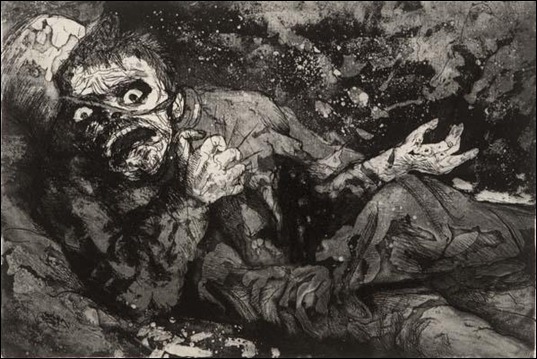Quattro Novembre segna fine della Prima Guerra Mondiale in Italia (The Fourth of November marks the anniversary of the end of the First World War in Italy).
When I was a child today used to be a national holiday and patriotic celebration of the greatness of our armed forces. All the barracks were open to the public, and grand rhetorical speeches were held in front of i monumenti ai caduti (the war memorials). During the last twenty years however, this commemorative date has faded away. WWI seems such a long time ago, and patriotism is now considered by many to be anachronistic.
 |
| Italian soldiers in the trenches during WWI |
This year is special though because it marks the 100th anniversary of the beginning of the First World War, and, as usual, centennials seem to stimulate public interest. Personally, I can’t hear about the Great War without immediately thinking of the tragic poem Veglia (Vigil), by the poet Giuseppe Ungaretti (1888 – 1970). Ungaretti is undoubtedly the most important Italian poet from the First World War period, not only because he took direct part in it, but also because of his very powerful graphic style. Ungaretti’s poems are very concise and minimalistic, every single word, and even the gaps between them, are poignant, there are few adjectives. He gives no place to patriotic rhetoric or heroism, only feelings of pain, horror, and, contrastingly, beauty and love.
I first studied this poem when I was at primary school, and still remember the vivid shocking images that flashed through my mind when I read it. The image that particularly filled me with horror was of a mouth distorted by the pain of death howling towards the moon like a wolf … la sua bocca digrignata volta al plenilunio.
 |
| VERWUNDETER BY OTTO DIX, 1916 |
Veglia was written on the 23rd of December 1915 at the Cima Quattro (Fourth Peak) outpost in the Carso area of the Alps, which today lies on the border between Italy and Slovenia.
Here is Veglia by Giuseppe Ungaretti, with my English translation:
Veglia
Un’intera nottata
buttato vicino
a un compagno
massacrato
con la sua bocca
digrignata
volta al plenilunio
con la congestione
delle sue mani
penetrata
nel mio silenzio
ho scritto
lettere piene d’amore
Non sono mai stato
tanto
attaccato alla vita
Vigil
A whole night
thrown near
a comrade
massacred
with his mouth
snarling
towards the full moon
with the swelling
of his hands
penetrating
my silence
I wrote
letters full of love
I’ve never been
more
attached to life







Comments:
Paul:
Many thanks for this.
Good to see that there was a similar Italian response to that of Wilfred Owen.
Though I have seen on an Italian war memorial the words
“Dulce et Decorum est
Pro patria mori”
which was of course condemned by Owen as “the old lie”.
I think this is related to WW1, as I understand it, having a different place in Italian history and memory than for the Brits, though recent commemorations in Britain seem to be trying to subvert this.
Original Italian WW1 memorials often appear very nationalistic compared to Brit ones, though it is clear that many (at least in the bit of Italy I know well) have been changed/remodelled.
Beware folk rewriting history, even if they appear to have the best of motives.
Thanks again for the poem.
Paul:
Postcript to above.
A little more reading seems to suggest that Ungaretti was a confirmed irredentist, fan of Mussolini, taker of the Fascist Lira.
ah well.
Maybe he’d weep for the removal of those old Italian war memorials topped with heroic action figures. And their plaques heralding a “greater Italy”.
Be wary of poets, read history.
Phil:
For those who are interested in this campaign, there is an excellent book (in English, I don’t know if there is a translation into Italian) entitled The White War: Life and Death on the Italian Front 1915-1919, by Mark Thompson. I and some friends have read it and all highly recommend it.
Serena:
@Phil Salve ancora Phil! I’m not familiar with this book, but it sounds interesting. I’ll see if I can find it, either in Italian or in English. Do you think you would be able to write a little review about it, that we could publish on the blog? If yes, we would be really pleased.
Saluti da Serena
Phil:
One more thing, the title should be “The Fourth of November.” Fourth is the number; forth means “onward, forward, go out.”
Interesting article and poem.
Phil
Serena:
@Phil Grazie Phil, ho subito corretto l’errore. Unfortunately when I write partly in Italian and partly in English I find it difficult to see certain spelling mistakes. And the spell check doesn’t correct them because both words do exist. Grazie ancora
Serena
Paul:
I can heartily second Phil’s recommendation of “The White War”. It really brings home the horror of the Italian war on that front – just as bad, maybe worse in some ways than that on the Western Fron because of the unbelievably tough terrain – vertical at times.
Professional and reader reviews will be available in many places on the web.
I got my copy of the book from my local London library.
Phil:
The White War: Life and Death on the Italian Front 1915-1919, by Mark Thompson
I was very interested in this book as my maternal grandfather fought in this war. In fact, he was at the Battle of Caporetto where poison gas was employed by the Germans against the Italians for the first time in WW I.
The book is not a first person narrative of life on the front lines. It describes the horror and misery of the Italian and Austro-Hungarian soldiers but it’s focus is higher up. It does a very good job of providing we non-Italian natives the history of the risorgimento and subsequent political manoeuvrings of Italy and the Austro-Hungarian Empire. There is also a great deal on the political and social factors which led to Italy’s entry into the war.
The book deals with more with the psychological aspects of the war and the pathos of the front lines. I don’t know how much of this is taught in Italian schools but I found it fascinating.
This is a relatively unknown front in WW I and this book is one of several which have recently come out discussing the people and events. I will warn our Italian natives that many of the Italian politicians, generals, and historical figures do not receive favorable treatment!
All in all, it was an excellent book and one I highly recommend.
Phil
Serena:
@Phil Salve Paul, what you wrote about the book and WW1 is very interesting! I must say that when I was in secondary school we vaguely touched this period and the following era (Fascism and WW2) due to “lack of time” of course. In reality this is still a very controversial topic and teachers prefer to avoid it. I’ll try to get hold of it.
The name Caporetto is still used in the Italian language to describe a disastrous defeat. I also know that many of the famous ‘strade ferrate’ created by the Alpini on the mountains during that war are still preserved as historical monuments, but I’ve never been in that area. Have you seen them?
Saluti da Serena
Paul:
Hi Serena
Only just seen your post after some trawling through this excellent blog – it would be good if there was an alert system for replies to threads one has posted on.
Yes, I realise that WW1 is still quite controversial in Italy – perhaps partly because it’s my understanding that in the early days the Fascist party was see as the representative of some of the more alienated ex soldiers (who of course had a lot to be alienated about – see Phil’s comment about many of the Italian leaders).
I was maybe understating the changing of war memorials and their use as an ongoing political debate. I’ve seen some where they appear to be on the third version/rewrite, including one which somewhat desperately gave the impression that the Italian soldiers were a bunch of peace loving hippies. I have also seen one with a separate dedication typed on paper and stuck to the monument in a plastic sleeve.
Do they change war memorials in your patch Serena?
John Foot wrote an excellent book about Italian war memorials and divided history though it concentrated rather more on WWII.
No I have never been to that area though I would like to. I understand that it is still littered with war debris and that corpses often turn up.
This exhibition was in London’s St James’ park recently and included a very impressive photo of some of the tracks the Italian soldiers quarried around and through sheer cliff faces:
http://www.fieldsofbattle1418.org/uk_tour.html
all the best
Paul
Paul:
PS
Found that pic I referred to – here:
http://fieldsofbattle.mediastorehouse.com/mt-pasubio-strada-del-galleria/print/9796999.html
Paul:
I am at a loss to understand why my two most recent posts (made when I returned after a while to see your post) didn’t appear.
Technical reasons? – I saw a message which said they were awaiting moderation.
Other? – They were eminently polite, reasonable and totally on topic.
It would be difficult to rewrite them, so I’ll just leave this impressive pic of the Italian front (see Serena’s post above) for people to contemplate.
http://fieldsofbattle.mediastorehouse.com/mt-pasubio-strada-del-galleria/print/9796999.html
Here’s to the new Italy. One that understands its history, good and bad, proud of its own achievements, aware of its faults, outward looking, and looking to the future.